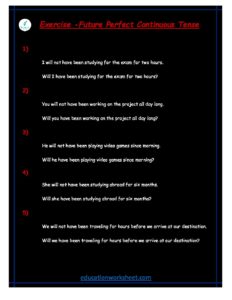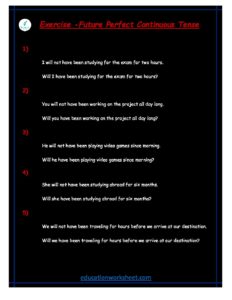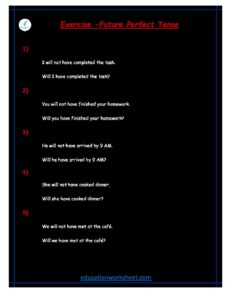Future Perfect Tense examples
Future Perfect Tense examples
The English language is a marvel of versatility, offering a variety of tenses to convey complex temporal relationships between actions, events, and states. Among these tenses, the future perfect tense is a fascinating and useful one. It allows us to express actions that will be completed at some point in the future before another future event or time reference. In this comprehensive guide, we will delve into the intricacies of the future perfect tense, explore its formation, usage, and provide numerous examples to illustrate its practical application. By the end of this article, you will have a solid understanding of how to use the future perfect tense effectively in your writing and conversation.
What is the Future Perfect Tense?

The future perfect tense is a grammatical construction that indicates an action or event that will have been completed at a specific point in the future. This tense is formed by using the auxiliary verb “will have” followed by the past participle of the main verb. It is primarily used to emphasize the completion of an action before a future time or event. To fully grasp the concept of the future perfect tense, let’s break it down:
- Auxiliary Verb “Will Have”: The auxiliary verb “will have” signifies the future aspect of the tense. “Will” is used to express future time, and “have” functions as a linking verb that connects the future to the past.
- Past Participle of the Main Verb: The past participle of the main verb is used to express the completion of the action. Regular verbs typically form the past participle by adding “-ed” to the base form (e.g., “walk” becomes “walked”). Irregular verbs have unique past participle forms (e.g., “go” becomes “gone”).
Formation of the Future Perfect Tense

To create a sentence in the future perfect tense, follow this structure:
- Affirmative Sentences:
- Subject + “will have” + past participle of the main verb
- Negative Sentences:
- Subject + “will not have” + past participle of the main verb (or “won’t have”)
- Interrogative Sentences:
- “Will” + subject + “have” + past participle of the main verb
- Negative Interrogative Sentences:
- “Will” + subject + “not have” + past participle of the main verb (or “won’t”)
Usage of the Future Perfect Tense
- Actions Completed Before a Future Time: The primary use of the future perfect tense is to describe actions that will be completed before a specific point in the future. This emphasizes the idea that the action is finished when the specified time arrives. For example:
- By the time the concert starts, the band will have rehearsed for three hours.
In this sentence, the action of rehearsing will be completed before the concert starts.
- Predicting Future Actions: The future perfect tense can also be used to predict or make assumptions about future actions, often in combination with words like “probably,” “likely,” or “certainly.” For example:
- By the end of the week, she will probably have finished the project.
This sentence suggests an assumption about the completion of the project by the end of the week.
- Hypothetical Situations: In hypothetical scenarios, the future perfect tense can be used to talk about what would have been completed in the future if certain conditions were met. For example:
- If they had enough funding, they would have built the new school by next year.
This sentence discusses a hypothetical situation where the completion of the school construction depends on having enough funding.
- Future Time References: The future perfect tense can also be used with specific future time references such as “by,” “by the time,” “before,” “by the end of,” and “in [a specific period of time].” These references indicate when the action will be completed. For example:
- I will have completed my degree by the end of next year.
Here, “by the end of next year” serves as the future time reference.
Examples of the Future Perfect Tense

To further understand the future perfect tense and its various uses, let’s explore numerous examples in different contexts:
Actions Completed Before a Future Time:
- By the time the party starts, John will have prepared all the food.
- In this sentence, the action of preparing the food will be completed before the party starts.
- They will have finished building the bridge by the end of the month.
- This sentence emphasizes the completion of the bridge construction by the end of the month.
- By the time he arrives, I will have cleaned the entire house.
- The house cleaning will be finished before his arrival.
- She will have submitted her thesis by the deadline.
- The action of submitting the thesis will occur before the deadline.
- By next year, we will have traveled to five different countries.
- This sentence indicates that the action of traveling to five countries will be completed before the next year.
Predicting Future Actions:
- The students will probably have completed the assignment by tomorrow.
- This suggests an assumption about the completion of the assignment by tomorrow.
- They will likely have painted the entire room by the time we get back.
- The assumption is that the painting will be done by the time of their return.
- With their work ethic, they will certainly have reached their sales target.
- The use of “certainly” implies confidence in achieving the sales target.
Hypothetical Situations:
- If they had known about the event, they would have bought tickets.
- This sentence presents a hypothetical scenario where buying tickets depends on having known about the event.
- If we had arrived on time, we would have caught the last train.
- Here, catching the last train is contingent on arriving on time.
Future Time References:
- I will have graduated from college by the time my brother starts his freshman year.
- The completion of the graduation occurs before the start of the brother’s freshman year.
- By the end of the week, we will have implemented the new software system.
- The new software system implementation will be completed by the end of the week.
- She will have read all the books in the series in two months.
- The action of reading all the books in the series will be completed within two months.
- By the time the party begins, they will have set up the decorations.
- The decorations will be set up before the party begins.
- In five years, I will have saved enough money to buy a house.
- The action of saving enough money to buy a house is expected to be completed in five years.

